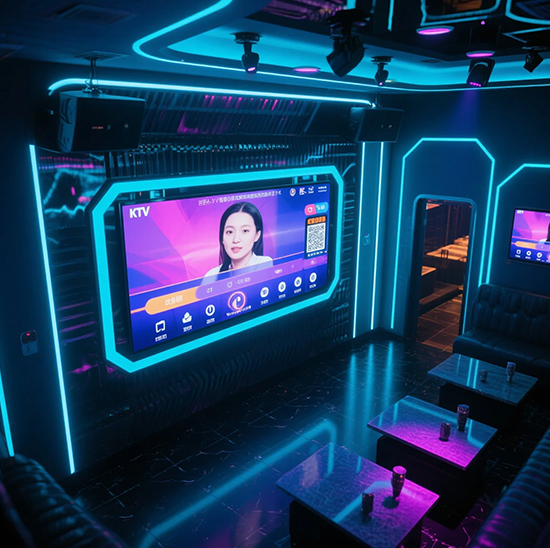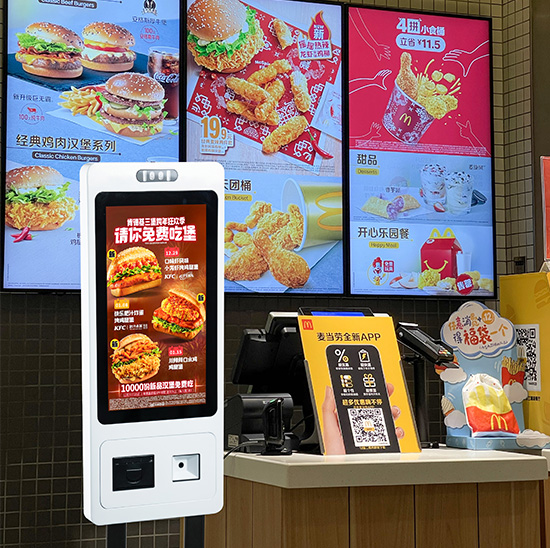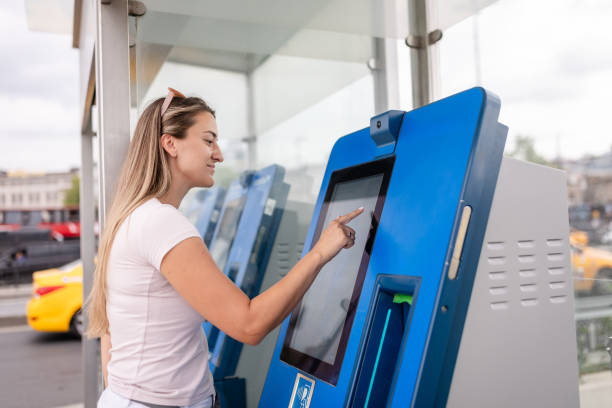متى كانت آخر مرة تقدر فيها تسجيل وصول سريع وخالي من المتاعب في مستشفى أو عيادة? العديد من المرافق الطبية تتبنى الآن أكشاك الرعاية الصحية, إحداث ثورة في طريقة تفاعل المرضى مع خدماتهم. تم تصميم أنظمة الخدمة الذاتية هذه لتبسيط المهام الإدارية, تقليل أوقات الانتظار, وتعزيز الكفاءة الإجمالية. في هذه المدونة, سنستكشف كيف تحول هذه الأكشاك المبتكرة بيئات الرعاية الصحية ولماذا أصبحت أداة أساسية في المكاتب والمستشفيات الطبية الحديثة.
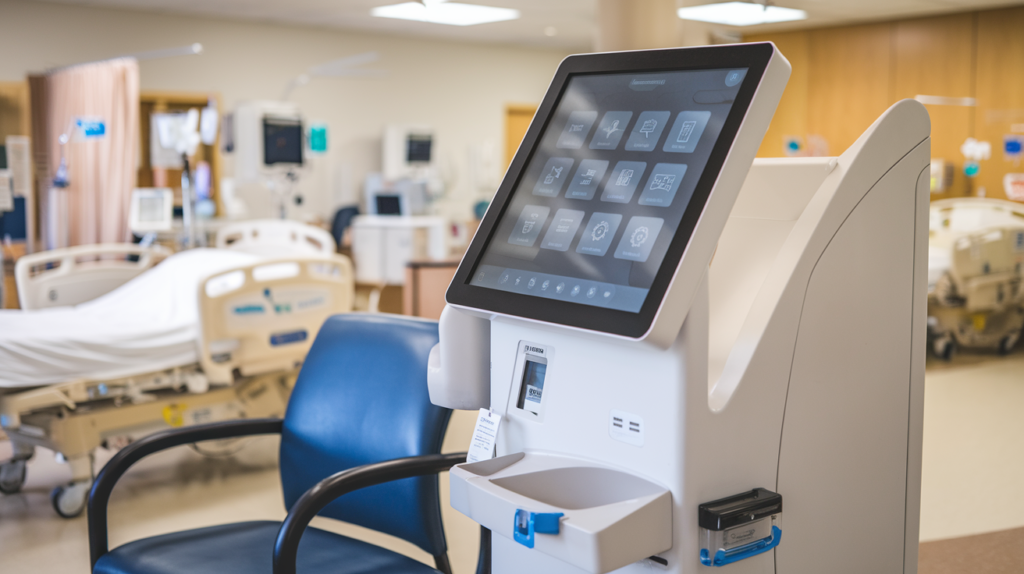
ما هي أكشاك الرعاية الصحية?
أكشاك الرعاية الصحية هي آلات الخدمة الذاتية المستخدمة في الإعدادات الطبية لتسهيل تفاعلات المريض المختلفة. وهي مصممة لتبسيط العمليات مثل تسجيلات الإضافية, جدولة المواعيد, وتحديثات المعلومات, تمكين المرضى من إدارة زياراتهم بشكل مستقل. يلعب كشك المكتب الطبي دورًا مهمًا في تحسين كفاءة مرافق الرعاية الصحية عن طريق تقليل أوقات الانتظار وعبء العمل الإداري.
ميزات نظام الأكشاك الصحية
يشتمل نظام كشك الرعاية الصحية على وظائف متطورة مصممة لتلبية المطالب الفريدة للصناعة الطبية. تشمل بعض الميزات البارزة:
- تأمين إدارة بيانات المريض: حماية التشفير المتقدمة المعلومات الحساسة.
- دعم متعدد اللغات: يضمن إمكانية الوصول إلى التركيبة السكانية للمريض المتنوعة.
- التكامل مع أنظمة المستشفيات: قابلية التشغيل البيني غير الملحومة مع السجلات الصحية الإلكترونية (ehr) أنظمة.
- أدوات مراقبة الصحة: توفر الأجهزة الطرفية المتكاملة مثل شاشات ضغط الدم أو موازين الحرارة قراءات فورية.
- برنامج قابل للتخصيص: تلبي التطبيقات المصممة الاحتياجات المحددة للمرافق المختلفة.
الاختلافات عن الأكشاك الأخرى
على عكس الأكشاك للأغراض العامة, تم تصميم أكشاك الرعاية الصحية خصيصًا للبيئات الطبية, دمج الميزات التي تلبي احتياجات المريض ولوائح الخصوصية. غالبًا ما تشمل آمنة, معالجة البيانات المتوافقة مع HIPAA, ضمان حماية معلومات المريض. بالإضافة إلى ذلك, تقدم أكشاك الرعاية الصحية وظائف متخصصة مثل مدخلات التاريخ الطبي, التحقق من التأمين, والتكامل مع السجلات الصحية الإلكترونية (ehr) أنظمة. بجانب, تضمن الشاشات الحساسة لدرجة الحرارة الاستخدام الآمن والصحي, خاصة في البيئات التي يكون فيها الصرف الصحي أمرًا بالغ الأهمية. هذه الميزات الفريدة تدفقات سير العمل, تعزيز تجربة المريض, والحفاظ على الامتثال الصارم لأنظمة الرعاية الصحية.
ما هي عملية تسجيل الوصول للكشك?
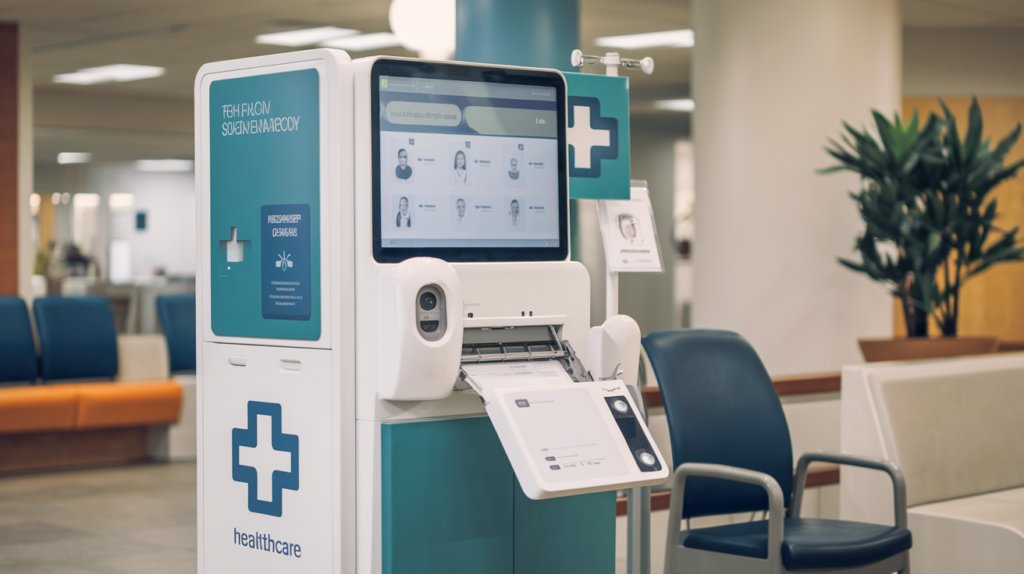
يقوم كشك تسجيل الوصول للرعاية الصحية بتبسيط عملية تسجيل المريض وتسريعها. إليك كيفية عملها عادة:
- الوصول والمصادقة: يدخل المرضى معرفاتهم الفريدة, مثل بطاقات الهوية أو القياسات الحيوية.
- التحقق من المعلومات: تفاصيل الإشارات عبر الكشك مع قواعد بيانات المستشفيات لتأكيد المواعيد.
- النماذج والموافقة: النماذج الرقمية, بما في ذلك التاريخ الطبي ووثائق الموافقة, يتم شغلها على الشاشة.
- معالجة الدفع: يمكن للمرضى تسوية المشاركين أو الأرصدة المتميزة بشكل آمن.
- قائمة الانتظار: يقوم النظام بتعيين المرضى لمناطق انتظار محددة, تحسين تدفق العيادة.
أنواع الآلات الكشبكية الشائعة والاستخدامات
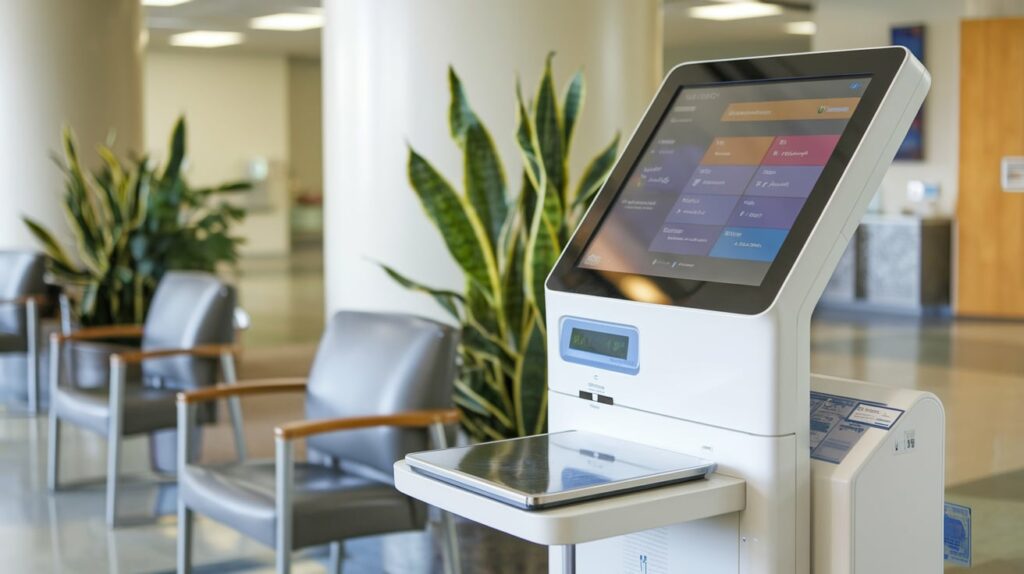
أكشاك الاستخدام الصحية هي أدوات متعددة الاستخدامات مصممة لتحسين رعاية المرضى وتبسيط المهام الإدارية. فيما يلي أنواع إضافية من الأكشاك الصحية واستخداماتها المحددة:
- كشك المعلومات الصحية: يوفر هذا كشك التثقيف الصحي القيم للمرضى, تقديم معلومات عن الظروف, العلاجات, استراتيجيات الوقاية, ونصائح العافية. عادة في مناطق الانتظار, يساعد المرضى على أن يصبحوا أكثر اطلاعًا أثناء تقليل وقت الخمول.
- Tele Digital كشك للرعاية الصحية: مصمم للاستشارات الافتراضية, يمكّن هذا كشك المرضى من التفاعل مع أخصائيي الرعاية الصحية عن بُعد. يسمح بمؤتمرات الفيديو, جعل الرعاية الصحية أكثر سهولة, خاصة في المناطق النائية أو المحرومة.
- كشك المساعدة الذاتية في الرعاية الصحية: تمكين المرضى من إدارة الرعاية الصحية الخاصة بهم بشكل مستقل, يتيح هذا كشك المستخدمين جدولة المواعيد, تحديث التفاصيل الشخصية, ونتائج Access Lab. يمكن أن تتكامل مع السجلات الطبية الإلكترونية, تزويد المرضى بوصول آمن إلى معلوماتهم الصحية.
- المدخول & كشك التسجيل: هذا الكشك يقلل من عملية تسجيل الوصول للمريض. يمكن للمرضى إدخال معلوماتهم, تحقق من تفاصيل التأمين, وأكمل النماذج المطلوبة, تقليل أوقات الانتظار والأعباء الإدارية للموظفين.
- كشك مراقبة الصحة: مزود بأجهزة استشعار لقياس العلامات الحيوية مثل ضغط الدم, معدل ضربات القلب, والوزن, يتيح هذا كشك المرضى مراقبة صحتهم ومشاركة البيانات مباشرة مع مقدمي الرعاية الصحية. يتم استخدامه بشكل شائع في الفحوصات الصحية الروتينية.
- دواء الاستغناء عن كشك: تقع في الصيدليات أو العيادات, هذا كشك يتصرف الأدوية المقررة تلقائيًا. يقلل من أوقات الانتظار وإمكانية توزيع الأخطاء, ضمان دقة أكبر وراحة للمرضى.
- الكشك: وجدت في المستشفيات الكبيرة أو المجمعات الطبية, يساعد هذا كشك المرضى على التنقل في المنشأة. يوفر خرائط واتجاهات تفاعلية, توجيه المرضى إلى مواقع المواعيد أو خدمات الطوارئ.
- رضا المريض كشك: هذا كشك يجمع ردود الفعل في الوقت الحقيقي من المرضى, السماح لهم بتقييم تجربتهم وتقديم التعليقات. يمكن لمرافق الرعاية الصحية استخدام هذه المعلومات لتحديد مجالات التحسين وتعزيز رضا المريض.
كيف يفيد Kiosk الموظفين والمرضى?
touchwo كشك يقدم فوائد كبيرة لكل من موظفي الرعاية الصحية والمرضى, جعلها أداة قيمة في البيئات الطبية الحديثة. كواحدة من الشركات الرائدة في مجال الرعاية الصحية, صمم Touchwo أكشاك تعزز الكفاءة التشغيلية, تحسين رعاية المرضى, وتبسيط العمليات الإدارية.
فوائد للموظفين:
- انخفاض العبء الإداري: مع القدرة على التعامل مع المهام مثل تسجيلات المريض, إدخال البيانات, والتحقق من التأمين, يتيح كشك الموظفين التركيز أكثر على رعاية المرضى وأقل على المهام الإدارية الروتينية.
- تحسين سير العمل: يضمن دمج أكشاك اللمس مع أنظمة المستشفيات تحديث معلومات المريض في الوقت الفعلي, تقليل الأخطاء والتأخير في معالجة البيانات. هذا يبسط سير العمل, تحسين الكفاءة الكلية لمرفق الرعاية الصحية.
- وفورات التكلفة: أتمتة الوظائف الإدارية من خلال الأكشاك يقلل من الحاجة إلى موظفين إضافيين, مما يؤدي إلى وفورات في التكاليف للمكاتب الطبية والمستشفيات.
- تفاعل أفضل للمريض: من خلال تقليل الوقت الذي يقضيه في المهام الإدارية, يمكن لموظفي الرعاية الصحية قضاء المزيد من الوقت في التفاعل مع المرضى, تحسين جودة الرعاية.
فوائد للمرضى:
- شيكات أسرع: يمكن للمرضى التحقق بسرعة وتحديث معلوماتهم, الذي يقلل من أوقات الانتظار ويعزز تجربتهم العامة.
- الاستقلال المعزز: تتيح طبيعة الخدمة الذاتية للكشك المرضى إدارة المهام المختلفة بشكل مستقل, مثل جدولة المواعيد, الوصول إلى المعلومات الصحية, أو مراجعة نتائج المختبر. هذا يعزز الشعور بالاستقلال والتمكين.
- تحسين الدقة: أكشاك Touchwo تضمن جمع بيانات دقيقة, تقليل مخاطر الخطأ البشري وضمان أن معلومات المريض صحيحة ومحدثة.
- راحة: مع القدرة على الوصول إلى الخدمات المختلفة من كشك واحد, يستفيد المرضى من أكثر انسيابية, زيارة مريحة لمقدم الرعاية الصحية.
Touchwo Health Kiosk في الطب الحديث
في المشهد المتطور للرعاية الصحية الحديثة, أصبحت أكشاك الخدمة الذاتية في الرعاية الصحية لا غنى عنها. Touchwo 2 تقوم أكشاك صحية مبتكرة بتحويل رعاية المرضى عن طريق تبسيط العمليات وتعزيز الكفاءة الإجمالية. دعونا نرى كيف يعمل.
Touchwo 22 ″ كشك اللمس متعدد الوظائف للخدمة الذاتية
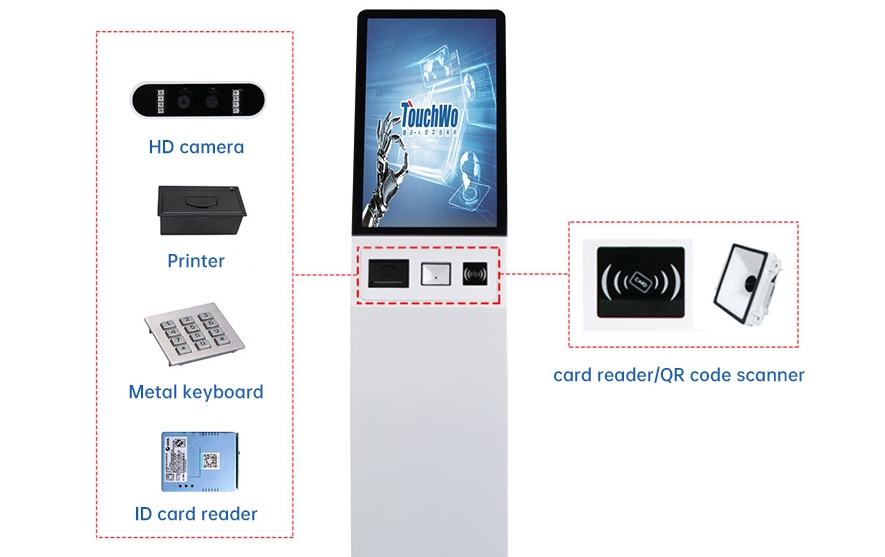
يعد Touchwo 22 ″ كشك اللمس متعدد الوظائف للخدمة الذاتية عبارة عن نظام كشك صحي متقدم مصمم لتحسين الكفاءة وتبسيط تفاعلات المرضى في إعدادات الرعاية الصحية. بتصميم أبيض نقي أنيق وأنيق, إنه يتميز بتفصيل عالي 1080*1920 شاشة FHD, ضمان واضح, صور واضحة لمشاركة المستخدم غير الملحومة.
مجهزة بطابعة حرارية, ماسحة رمز الاستجابة السريعة, و NFC/RFID قدرات, يسهل المعاملات السريعة والآمنة. نظام الكاميرا المزدوج يعزز الوظيفة, بينما التوافق مع أنظمة تشغيل متعددة, بما في ذلك النوافذ, ذكري المظهر, ولينكس, يضمن التكامل المرن في الأنظمة الحالية. يعمل هذا الحل الكل في واحد على تحسين تجربة المريض والأداء التشغيلي.
Touchwo 15.6 ″ حامل الكشك في قائمة انتظار الخدمة الذاتية
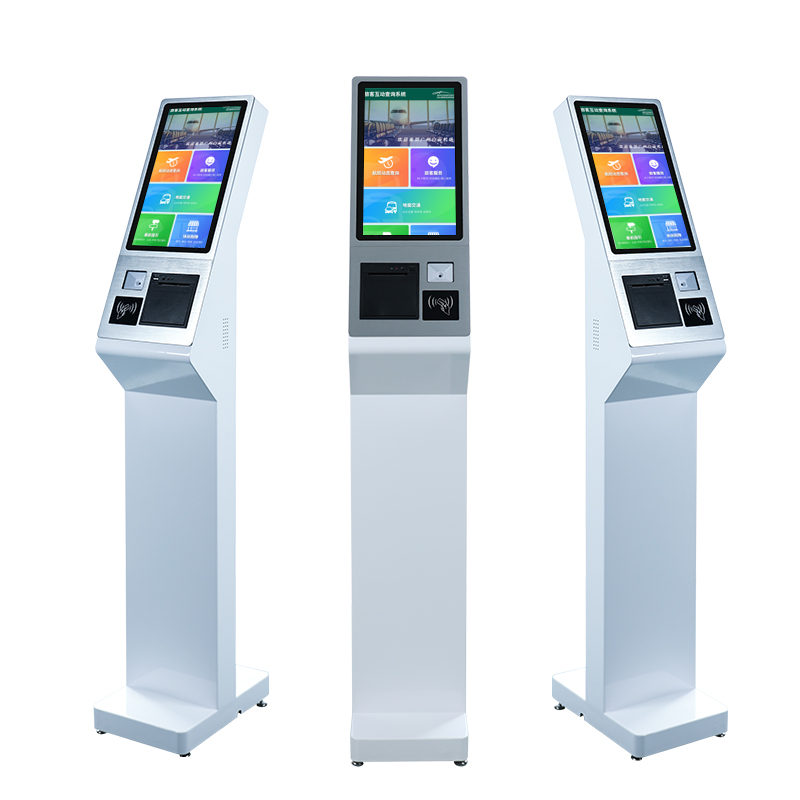
تم تصميم حامل الكشك في قائمة انتظار الخدمات الذاتية 15.6 ″ 24/7 إستخدام تجاري, مما يجعلها خيارًا مثاليًا لبيئات الرعاية الصحية والتجزئة عالية الحركة. كجزء من نظام كشكنا الصحي الشامل, إنه يوفر عملية سلسة مع Android, شبابيك 10, وخيارات نظام التشغيل Linux لتلبية احتياجات الأعمال المختلفة. يأتي الكشك مع مجموعة واسعة من الخيارات الطرفية, بما في ذلك قراء بطاقة الهوية لبلدان متعددة, ماسحات رمز الاستجابة السريعة, الطابعات الحرارية, قراء RFID/NFC, الكاميرات, ومسارات البصمات.
مصمم للمتانة, إنه يتميز بجبهة تصنيف IP65, توفير حماية مقاومة للأغمر ومقاومة للماء. بتصميمه الأبيض النقي الأنيق والأداء الموثوق به, تم تصميم هذا الكشك لتشغيل على مدار الساعة دون حل وسط. كما يوفر SDK كاملة للتنمية الثانوية, إلى جانب برامج التشغيل ومواد التطوير لدمج وتخصيص احتياجاتك.
عوامل لاختيار كشكك المناسب لعملك
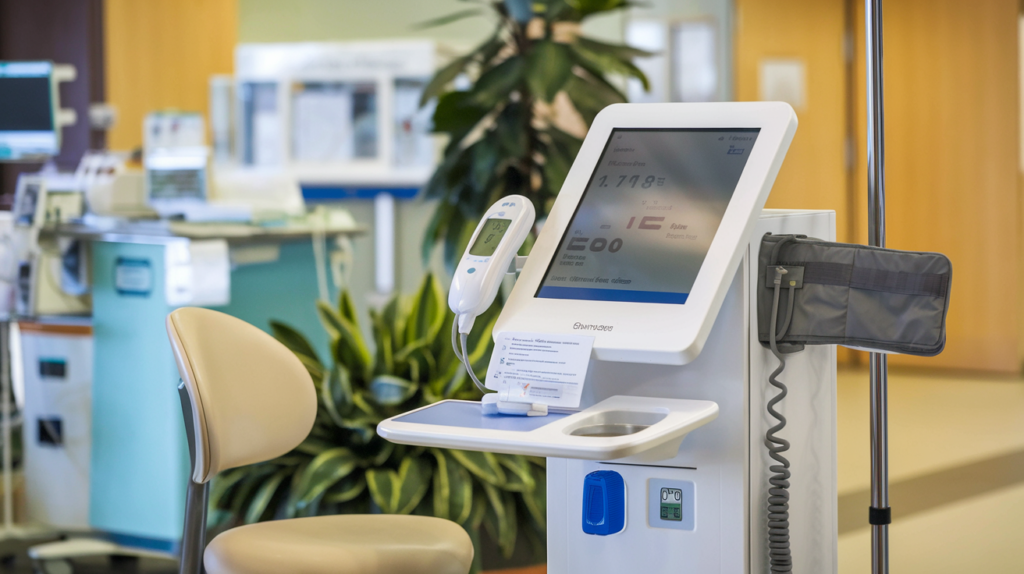
عند اختيار كشك صحي ذكي, من الضروري النظر في العوامل المختلفة التي تضمن تلبية كل من المتطلبات التشغيلية لمرفق الرعاية الصحية وتوقعات مرضاك. فيما يلي جوانب رئيسية لتقييمها عند اختيار كشكك المناسب لعملك.
الوظيفة
يجب أن تلبي وظائف نظام كشك الرعاية الصحية مباشرة احتياجات بيئة الرعاية الصحية. يجب تجهيز كشك يستخدم لفحص المريض للتعامل مع المهام مثل التحقق من التأمين, نموذج التقديم, وجدولة التعيين. مثل هذه الميزات لا تحسن تدفق المريض فحسب ، بل تقلل أيضًا من أخطاء الدخول اليدوي, ضمان معالجة بيانات المريض بسرعة وبدقة. بالإضافة إلى ذلك, تسمح الأكشاك المتقدمة بالتكامل مع أدوات التشخيص وأنظمة البيانات السريرية, مزيد من تعزيز دورهم في تبسيط العمليات الطبية.
قدرات التكامل
يجب أن يتكامل نظام كشك الرعاية الصحية بسلاسة مع برنامج إدارة المستشفيات أو العيادة الحالية, مثل السجلات الصحية الإلكترونية (ehr) وأنظمة إدارة المريض (PMS). يضمن هذا التكامل نقل معلومات المريض تلقائيًا إلى الإدارات الصحيحة دون الحاجة إلى الإدخال اليدوي, تقليل التأخير وزيادة الدقة. على سبيل المثال, يمكن للأكشاك تحديث سجلات المرضى على الفور عند إدخال بيانات جديدة, توفير الوصول في الوقت الفعلي إلى أحدث المعلومات الطبية عبر مختلف أقسام المستشفيات. هذا التكامل السلس يقلل من الأعباء الإدارية ويحسن كفاءة سير العمل.
متانة
يجب بناء الأكشاك في إعدادات الرعاية الصحية لتحمل الاستخدام المستمر والتعرض المحتمل للظروف القاسية. يجب أن تحتوي الأكشاك الطبية على ميزات مثل سطح مقاوم للخدش ومقاومة للماء, تصميم مقاوم للغبار. غالبًا ما تخضع هذه الأكشاك للتنظيف بمواد كيميائية قاسية, لذا فإن التأكد من أن لديهم تصنيفات IP65 أو معايير مماثلة لمقاومة الماء والغبار أمر حيوي للحفاظ على وظائف طويلة الأجل. هذا التصميم القوي يقلل من التوقف, ضمان استمرار العمل بكفاءة حتى في البيئات عالية الطلب.
واجهة المستخدم
واجهة مستخدم بديهية ويمكن الوصول إليها أمر بالغ الأهمية في أكشاك الرعاية الصحية, لأنه يؤثر بشكل مباشر على كيفية تفاعل المرضى مع النظام. كبير, تساعد الخطوط الواضحة والأزرار المشفرة بالألوان على توجيه المرضى خلال عملية تسجيل الوصول, تقليل الارتباك والأخطاء. بالإضافة إلى ذلك, يجب أن تستوعب الأكشاك المرضى الذين يعانون من مستويات مختلفة من محو الأمية التكنولوجية, بما في ذلك كبار السن أو الأفراد ذوي الإعاقة. تعزيز التعليمات المرئية وخيارات متعددة اللغات أيضًا تعزيز إمكانية الوصول, جعل العملية أسرع وأكثر شمولية. كلما كانت واجهة سديلة الاستخدام أكثر, كلما كان الاعتماد أقل على مساعدة الموظفين, في نهاية المطاف تحسين تجربة المريض والكفاءة التشغيلية.
حماية البيانات
بالنظر إلى الطبيعة الحساسة لمعلومات الرعاية الصحية, يجب على الأكشاك إعطاء الأولوية لتدابير حماية البيانات القوية. يجب أن تلتزم الأكشاك بالمعايير التنظيمية مثل HIPAA لضمان سرية المريض والتعامل الآمن للبيانات الطبية. باستخدام تشفير جميع عمليات نقل البيانات وآليات تسجيل الدخول الآمنة, مثل المصادقة الحيوية أو RFID, يضمن أن الأفراد المعتمدين فقط يمكنهم الوصول إلى البيانات الحساسة. يجب أن تقوم أنظمة كشك أيضًا بتحديث برامج الأمان بانتظام للحماية من التهديدات المتطورة, ويجب على البائعين تقديم الدعم المستمر لمعالجة نقاط الضعف.
الدعم والصيانة
موثوق, يعد الدعم المستمر والصيانة ضرورية للحفاظ على عمل أكشاك الرعاية الصحية على المستويات المثلى. يجب أن تقدم شركة تصنيع كشك الرعاية الصحية اتفاقية مستوى خدمة واضحة (SLA), تحديد أوقات الاستجابة للإصلاحات وتحديثات البرامج. هذا يضمن أن تظل الأكشاك تعمل حتى في حالة حدوث مشكلات فنية. صيانة منتظمة, بما في ذلك تصحيحات البرامج وتفتيشات الأجهزة, يساعد على منع أوقات التوقف غير المتوقعة, ضمان تحديث النظام باستمرار مع أحدث الميزات وبروتوكولات الأمان.
تعاون مع Touchwo
يجب ألا تشعر الرعاية الصحية أبدًا بالسحر, يساعد كشك الرعاية الصحية في جعل الزيارات الطبية أكثر سلاسة للجميع. مع تسجيلات فعالة, معالجة البيانات القوية, وخيارات الخدمة الذاتية, تعمل هذه الأنظمة على تحسين سير العمل ورضا المريض. يفخر Touchwo بقيادة هذا التطور مع حلول مبتكرة. على استعداد لرفع مرفق الرعاية الصحية الخاص بك? اكتشف المستقبل باستخدام أكشاك TouchWo المتقدمة وإعادة تعريف رعاية المرضى اليوم.

